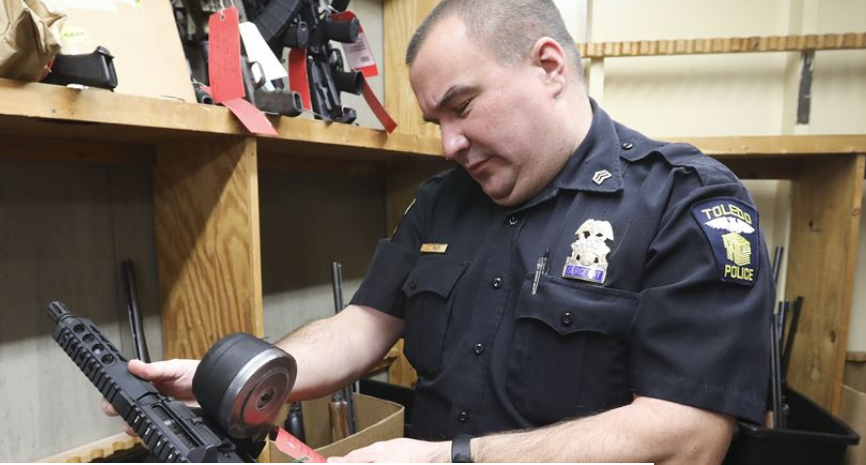Property cards dating back to the early 1900s provide a log of everything once there.
Enter Article DATE HERE
Every time Sgt. Edward Mack passes the box of evidence in Jane Doe’s unsolved 1987 homicide, he raps his knuckles on the cardboard and tells her, “I’ll find you.”
And sometimes, she seems to answer back — once after pulling her box he said the sensors in the evidence room were going off signaling movement in the room but it was empty; another time, when he made a call on her case, the power went out.
He thinks it’s the unidentified woman’s way of reminding police not to forget about her.
They won’t, he says: it’s the evidence room’s job to remember everything.
In the basement of the Toledo Police Department, more than 20,000 items collected from crime scenes across the city each year are stored to help verify what happened or to be used to find and convict suspects.
To make room for new evidence, some items do have to be purged each year — property in completed cases can be returned to the owner, burned, pitched, or, if left unclaimed for more than 30 days, sold — but even then the room doesn’t forget. Property cards dating back to the early 1900s provide a log of everything once there.
“We can’t hold on to that forever,” Sergeant Mack said of evidence, though he clarified that excludes items collected in homicide and sex assault cases, which are kept forever “because there’s so much potential for DNA now.”
What remains tells a story about violence and crime in Toledo.
“You name it, we got it,” Sergeant Mack said.
There are skulls of unidentified people and hundreds of boxes marked homicide. A jacket taken off of a decaying homicide victim sits in a deep freezer, pieces of the victim’s skin still attached to it.
Drugs could fill up one room — heroin, crack, cocaine, and enough marijuana to overwhelm the nose of anyone entering. A 16-year-old sample of cocaine still being stored has crystallized into solid orange balls. “Caution, fentanyl,” some boxes warned.
Stacks of folders marked drug paraphernalia fill two large shelves. Once, the room housed a 55-gallon drum of THC wax.
There’s also explosives, bathtubs, slot machines, and garbage cans stuffed with baseball bats, crow bars, shovels, and a single crutch reportedly used in a 2017 assault case. The tag on a samurai sword said it was seized during an animal cruelty investigation in April.
In a separate locked room is an arsenal of rifles: an AK-47 replica, numerous AR-15s, hunting rifles, and even some from the World War II era. Some of the assault-style weapons had 100-round drums attached.
Handguns are stored separately.
An AR-15 with a purchase tag still attached said it was seized in September, 2018, related to involuntary commitment for mental health reasons. Most of the guns appeared to have been taken during drug trafficking investigations or because the owners weren’t legally allowed to possess them, according to property cards.
Ammunition for those weapons was stored by the coffee can — literal 30-ounce coffee canisters filled with live rounds, which officers sometimes use for practice shooting at the range.
“If we can use it we will, and save the city some money,” Sergeant Mack said.
Other items filling the shelves were connected to less threatening crimes.
A pink Charming Charlie shopping bag filled with tin foil and duct tape is being held in a possession of criminal tools case. Other bags were overflowing with unopened Victoria Secret and Bath and Body Works sprays and lotions, presumably shoplifted from the stores.
In a trash pile headed for the landfill was former evidence no longer needing safeguarding: a side mirror collected from a Feb. 10, 2018, crash; a cane; a glass figurine; and an envelope containing a partially smoked cigar from a February, 2018, aggravated robbery case.
Guns, drugs, computer hardware, and identification materials are burned at a facility out of state.
Anything else in good condition and not claimed by its owners can be sold at auction on propertyroom.com, which generates about $8,000 a year in extra funds for the department, Sergeant Mack said.
The website has a collection of items for sale from police evidence rooms across the country.
There’s no way to search by department, but a recent scan of the items for sale showed art, bicycles, collector items, electronics, jewelry, clothing, musical instruments, tools and vehicles, all at a bargain price.
In November, items posted for sale on the site included a new $1,495 Aquaswiss Bolt L Diamond watch selling for $110 and an 18-karat gold Gucci watch selling for $55.
A DeWalt air compressor, which regularly retails for about $200, was priced at $27.
There were also fur coats for under $300; Louis Vuitton purses for under $600; iPads for about $100; and bicycles starting at $1.


